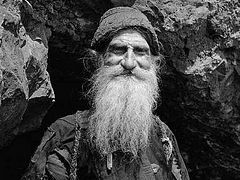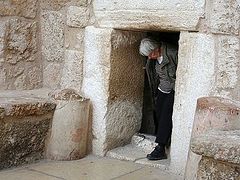The more one humbles himself, the easier and more natural obedience becomes for him. From my humble spiritual experience I have learned that it is much easier to lead a spiritual life with humility, and that grace is given to the humble.
Lack of humility leads to strife, confrontation, hidden motives, prejudice and stubbornness. All these things make the monastic life more difficult, and it becomes darker than the color of our ryassas. Though all of these things are trivial and unimportant, they are nothing but selfishness and remnants of pride. These passions, like woodworms, destroy the foundation of a good monastic life.
Abba Isaiah says, “A monk is one who constantly rejoices”. That’s how a monk is defined; he says that a monk is one who is always happy.
Though some of you may object:
“But St. Ephraim speaks to us of tears…”
Or:
“Other fathers speak of fasting, hardships and sorrow…”
When we speak of a monk who "is always rejoicing," we do not mean that he is always joking. Quite the contrary; for, as father Emilianos says, in doing so [i.e. always joking] a monk tries to cover up his inner imbalance by creating an image different from the one that actually belongs to him. What we are talking about here is the joy that is associated with the monk’s inner peace, sobriety and tranquility, which bestow upon him the sweetness and redemption of Christ.
There is a well-known saying of St. Pasius the Athonite: “I have so much joy that I don’t know what to do with it. I could charge solar panels with it on rainy days.” He said this not in order to impress people, but to share his own personal experience. This is how a church-going person should be living. The word “Christian” to a certain extent means a person that is full of joy.
St. Silouan the Athonite in one of his prayers said, "Please, Lord, do not send me any more joy, because I can not bear it. My heart will burst from joy.” This can be experienced by all people, especially by those who have dedicated themselves to God—that is, by monks.
And elsewhere St. Paisius wrote, “If I put half of my joy on the right side of a scale, and all the joy that exists in this world on the left side, then the side with my joy will outweigh the other one.”
What did St. Paisius mean? He was poor, very sick, feeble, and simple-minded. He suffered from a dozen different illnesses. He had nothing. But this man, on whom, as they say, your gaze will not linger, lived as though he were a king. How can that be? Because he was capable of controlling his passions and was a truly humble man.
The humble man is not afraid to fall, because he stands below all. He has nowhere to fall. A humble person does not quarrel with anyone, does not complain, does not feel fear. A humble person is happy whether he is chosen to sing in the choir, appointed to work in the chancery, or to wash dishes in the refectory of the monastery. He will be happy and useful everywhere. The presence of a humble person brings about a calmness that is transmitted to others. Whereas communicating with other kind of people can be difficult—you don’t know how to approach them, and no matter what you say to them, whether it is good or bad, they “explode”. This shows that they have no humility.
But, as the great father of the Church, St. John Chrysostom, wrote, there exists a sickly kind of humility. What we mean here is the haughty kind of piety that is nothing more than words and an outer appearance—that is, fake humility. For example, you say humbly, “I want to be last.” But when you end up being last somewhere, you start to grumble.
A woman once said to a priest. “I’m the most sinful woman in the world.” And when they were on a pilgrimage to Jerusalem, the priest said to her, “Sinful woman, come here.” But she answered, “Father, how dare you?! How can you talk to me like that?!” “But weren’t you the one who told me you were the greatest sinner in the world?” he asked.
So we can only talk about things like that ourselves, but we don't allow others to do so. It turns out that our humility is false. This is a sign of an unhealthy situation, because we imagine ourselves in a different way, in a way that is not our real self. In the Gospel Christ addresses hypocrites with the sternest of words (Mt. 23).
As I have said before, this is the "wearing of a pious mask", or a “theatrical performance”. It’s a game one plays with spiritual matters, presenting themselves as the kind of person they’re not. I'm not saying we should divulge our sins and publicly humiliate ourselves. What I am saying is that we should not exalt ourselves with all these grandiloquent words. Pseudo-humble words, or a pseudo-humble look are a serious disease that undermines the foundations of our spiritual life. We have to truly be humble people.
On such a one will I look: On him who is poor and of a contrite spirit, and who trembles at My word (Is. 66:2), says the Lord.
That is the one upon whom the Lord glances. Fr. Tikhon, the elder of St. Paisios, would say, “Each morning the Lord blesses the world with His right hand, but the humble He blesses with both hands.” And he would also say that different kinds of people will end up in hell: people that give alms, or that pray, or fast, or are virgins, or monks, or priests can all end up there. But not a single humble person will go there. Likewise, different kinds of people will go to Heaven. But for the proud person Heaven is closed. As it’s been said, humility is the Cerberus (the watchdog) of all the other virtues.
St. Basil the Great says that humility is the raiment of the Godhead. Christ in His pure humility left the glory of Heaven and came to earth, took upon Himself human nature and became the most debased of all men, although he had no sins.
Some modern theologians make a great mistake when they say that Christ attained perfection. This is an erroneous statement. Christ was always perfect.
Humility is the basis of all virtues. If you pray without humility, your prayer will rise up no higher than your own head. If you start praying and say to yourself: “I’m a righteous person!” Or: “I’m not like others!” then your prayer cannot reach God.
The humble man has tears, and reverence, and selflessness, and is attentive when being taught. The humble man is abundantly blessed by God. All our problems arise from a lack of humility. That’s the reason. And pride destroys us, whether it is present in a small or large degree. Therefore our Lord gives us opportunities for obedience, for this is the way to humility.
Maybe one knows how to do something, but needs to attain humility—not as a soldier might, who has to receive permission to do something, but by asking for the blessing of one’s spiritual father.
Our daily failures in life are also a cause for humility. And illness can also be a cause for humility. Slander, sarcastic remarks or being denied can also be causes for humility. All these are good things that help us become humble.
A certain monk wept, saying, “God has forsaken me: I have no temptations.” He believed that if he had no temptations, it meant the Lord had distanced Himself from him.
So we have to try hard to truly become humble; then we will attain to a state of bliss and will not be afraid of anything. We will not distance ourselves from each other, will not have a feeling of inferiority, will not get upset... And we will feel as if we are living in Heaven, because Heaven will be filled with humble people.
There are no saints that are not humble. They were all humble people. And our Greek synaxarion, which describes the lives of the saints, is an ocean of humility. As St. Cosmas of Aetolia says: "Humility and love are the two wings with which we will fly to Paradise."
Let us pray to the Mt. Athos saints in whose cells we are currently living. There are certain beautiful words of praise written by St. Nicodemus the Athonite. He wrote that we live in their abodes, monasteries, cells, which they have created with such efforts, sacrifices, struggles and tears; let us therefore pray to these saints, that they may send us their support, help and comfort so that we may become truly humble.





